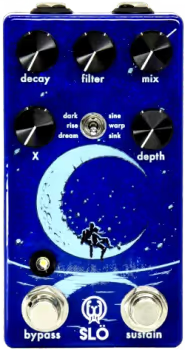
Essential Post-Rock Guitar Pedals for Building Atmospheric Soundscapes

Post-rock guitar isn’t about technical virtuosity or crushing riffs – it’s about emotional storytelling through sound. Bands like Explosions in the Sky, Godspeed You! Black Emperor, and This Will Destroy You have mastered the art of creating cinematic soundscapes that build from whisper-quiet beginnings to earth-shaking climaxes.
But how do you capture those expansive, atmospheric tones that make post-rock so emotionally compelling? The secret lies in understanding both the pedal combinations and playing techniques that transform simple guitar parts into orchestral textures.
Unlike other genres that rely heavily on amp distortion, post-rock is built on a foundation of clean, high-headroom amplifiers and carefully chosen effects that create space, movement, and dynamic contrast. It’s about using silence as much as sound, and building tension through repetition and gradual intensity.
The Foundation: Clean Amps and Pristine Platforms
Post-rock guitarists universally prefer high-headroom clean amplifiers like the Fender Twin Reverb or similar solid-state options. The goal is a pristine, uncolored platform that lets your effects shine without unwanted amp distortion muddying the mix.
Your amp should stay completely clean even when you’re playing at full volume, providing plenty of headroom for dynamic swells and ensuring that your reverbs and delays remain clear and musical. Think of your amp not as a tone source, but as a transparent delivery system for your pedalboard’s sonic architecture.
Volume Swells: The Heart of Ambient Guitar
The volume swell is post-rock’s signature technique – striking a chord or note and using a volume pedal to slowly bring it into the mix. This eliminates the percussive attack and creates that characteristic “breathing” quality that makes post-rock so atmospheric.
The magic happens when you combine volume swells with delay and reverb. As you swell in a note, the effects create cascading layers that build into complex, orchestral textures. The key is timing – learning to anticipate when to start your swell so the note blooms perfectly with the song’s rhythm.
The Automatic Solution: FreqScene Slow Life
For guitarists who want violin-like swells without the footwork, the Slow Life is a reimagination of the legendary Boss SG-1 Slow Gear. This auto-swell pedal creates those signature post-rock crescendos automatically – simply strike a note and the pedal creates the swell for you.
The range control addresses the original SG-1’s limitation of short swell times, allowing for the longer, more dramatic buildups that define modern post-rock. The built-in compressor helps manage the delicate picking dynamics needed for consistent swells, making it perfect for intricate fingerpicked passages that build into orchestral walls of sound.
When combined with reverb and delay, the Slow Life transforms simple chord progressions into cinematic soundscapes that breathe and pulse with organic life. It’s the perfect tool for post-rock guitarists who want to focus on playing rather than pedal technique.
Get one directly from FreqScene Effects Co.
Tremolo Picking and Cascading Textures
Tremolo picking combined with delay creates the “shower of notes” effect that’s essential to post-rock. Pick a single note rapidly while a delay pedal creates rhythmic echoes – as you move between frets, the repeats blend into complex, polyrhythmic patterns that sound like multiple guitarists playing interlocking parts.
This technique works best with moderate delay times (around 200-400ms) and moderate feedback settings that create 3-4 clear repeats. Too much feedback creates mud; too little loses the cascading effect.
Delay: The Pulse of Post-Rock
Delay is absolutely essential for post-rock – it’s what transforms simple guitar parts into complex, interwoven textures. You’ll want both analog delays for warmth and digital delays for pristine clarity, depending on the musical context.
The Analog Classic: Boss DM-2W Delay
The DM-2W recreates the legendary Boss DM-2 with authentic bucket-brigade warmth that sits perfectly in dense mixes. The analog compression and subtle modulation add character without overwhelming your tone, while the self-oscillation capability lets you create dramatic builds and transitions.
The custom mode extends delay time while maintaining the original’s musical feedback characteristics. It’s perfect for ambient repeats that add texture without cluttering the mix – exactly what post-rock demands.
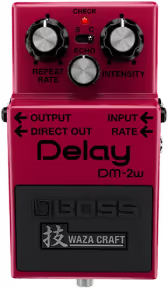
Buy through these links and support Loopy Demos
at no extra cost to you.
The Modern Marvel: MXR Joshua Ambient Echo
The MXR Joshua is a digital delay powerhouse designed specifically for ambient and post-rock applications. With stereo ping-pong delays, tap tempo with subdivisions, and built-in modulation, it creates the kind of complex rhythmic patterns that define modern post-rock.
The subdivision control lets you create polyrhythmic effects that work perfectly with tremolo picking, while the modulation section adds subtle movement that keeps long delay trails interesting. The stereo outputs create expansive soundscapes that fill the entire mix.
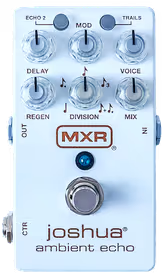
Buy through these links and support Loopy Demos
at no extra cost to you.
The Versatile Essential: Walrus Audio Fundamental Delay
The Fundamental Delay offers three distinct modes that cover every post-rock application: pristine digital for clean repeats, warm analog emulation for vintage character, and reverse delay for those dreamy, backwards textures that add otherworldly character to ambient sections.
The tap tempo makes it easy to sync delays to your songs, while the 650ms maximum delay time is perfect for creating spacious echoes. The reverse mode is particularly brilliant for creating anticipation before big sections – those backwards swells that seem to pull the music forward.
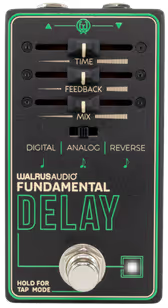
Buy through these links and support Loopy Demos
at no extra cost to you.
The Experimental Tool: Old Blood Noise Endeavors BL-44 Reverse
The BL-44 is what OBNE calls a “shoegazer’s dream” – a reverse delay that creates ethereal, backwards textures perfect for post-rock’s more experimental moments. Unlike traditional delays, it reverses your signal before adding delay, creating magical backwards swells that seem to materialize from thin air.
The glitch modes add subtle digital artifacts that enhance the lo-fi character, while the clean and dirty algorithms offer different sonic flavors. It’s perfect for transitional sections where you want to create mystery and anticipation before launching into bigger dynamics.
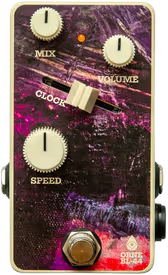
Buy through these links and support Loopy Demos
at no extra cost to you.
Reverb: Creating Infinite Space
Post-rock reverb isn’t just about adding ambience – it’s about creating three-dimensional space that makes your guitar sound like it’s emanating from vast landscapes or cathedral-sized rooms.
The Post-Rock Essential: Walrus Audio Slö Multi Texture Reverb
The Slö is arguably the most important post-rock pedal ever made. Its three algorithms are perfectly suited for the genre: Dark mode adds an octave-down component for massive, orchestral textures; Rise mode creates automatic volume swells that eliminate the need for a volume pedal; and Dream mode delivers lush, ambient textures that transform simple chords into cinematic soundscapes.
The sustain control lets you create infinite, droning textures, while the tone knob shapes the reverb’s character from dark and moody to bright and ethereal. Every post-rock guitarist should own this pedal – it’s that essential.
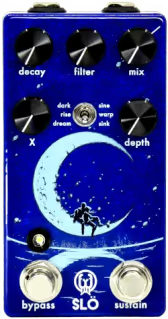
Buy through these links and support Loopy Demos
at no extra cost to you.
The Atmospheric Builder: Catalinbread Sinkhole
The Sinkhole is a modulated reverb that creates synth pad-like textures perfect for post-rock’s atmospheric buildups. Unlike traditional reverbs, it features interactive modulation and feedback controls that let you sculpt everything from subtle movement to rich, psychedelic textures that breathe with your performance.
The dedicated feedback control enables controlled self-oscillation for those dramatic crescendos, while the modulation section adds organic movement that keeps long reverb tails interesting. Despite its atmospheric capabilities, the Sinkhole maintains remarkable note clarity even in complex chord progressions—essential for post-rock’s intricate arrangements.
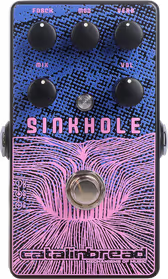
Buy through these links and support Loopy Demos
at no extra cost to you.
The Clean Classic: Walrus Audio Fundamental Reverb
Sometimes you need pristine, musical reverb without coloration or complexity. The Fundamental Reverb delivers high-quality hall, plate, and spring algorithms that add space without overwhelming your tone or breaking the bank.
The mix control lets you dial in everything from subtle ambient enhancement to completely wet, ethereal textures. It’s the perfect utility reverb for post-rock applications where the reverb should enhance rather than dominate your guitar tone.
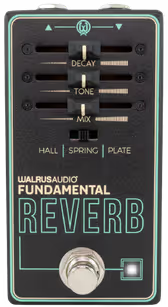
Buy through these links and support Loopy Demos
at no extra cost to you.
The Ambient Soundscape Machine: Walrus Audio Lore
The Lore is Walrus Audio’s experimental reverb playground – five distinct programs that transform your guitar into an ambient orchestra. From reverse swells to pitch-shifted textures, the Lore creates the kind of mysterious, ethereal soundscapes that make post-rock so captivating.
Program 1 delivers classic reverse reverb perfect for dreamy swells, while Programs 4 and 5 add pitch shifting for otherworldly textures. The X knob provides real-time parameter control, and the momentary footswitch lets you create dramatic ambient builds. It’s the perfect pedal for post-rock artists who want to add cinematic depth and experimental textures to their sound.
The Lore isn’t about subtlety – it’s about sound exploration and creating unique ambient textures that can’t be achieved with traditional reverbs. Think of it as having a mysterious orchestra playing somewhere far away, perfectly complementing your guitar parts.
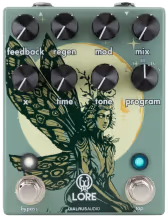
Buy through these links and support Loopy Demos
at no extra cost to you.
Heavy Textures: Fuzz for Post-Rock Dynamics
While post-rock is built on clean foundations, heavy fuzz pedals are essential for the genre’s more aggressive sections. Big Muff-style fuzzes provide the massive sustain and textural density needed for crushing climaxes and walls of sound.
My Favorite Big Muffs: EHX Nano Series
I’ve been a Big Muff devotee since my first band back in 2008, and Electro-Harmonix’s Nano series represents the best of their legendary fuzz legacy in pedalboard-friendly enclosures. After extensive testing, three variants have become my go-to choices for different post-rock applications:
Green Russian Reissue - This is my secret weapon for heavier post-rock sections. The less pronounced mid-scoop and overall warmer tone make it perfect for atmospheric buildups where you need crushing weight without losing note definition. The slightly reduced gain compared to other variants means it won’t turn into mush during complex chord progressions—exactly what you need when layering multiple guitar parts in dense post-rock arrangements.
Ram’s Head Reissue - Hands down, this is my favorite Big Muff of all time. With significantly more highs and upper mids and less mid-scoop than other variants, it’s the most balanced and usable Muff for full-band contexts. I understand why J. Mascis swears by this circuit—it delivers that essential Big Muff sustain while cutting through the mix beautifully. It’s become my default choice for post-rock climaxes where the fuzz needs to soar above the rhythm section.
Op-Amp Reissue - For the most extreme post-rock moments, I reach for the Op-Amp. This Smashing Pumpkins-inspired variant is beautifully nasty with its pronounced mid-scoop and aggressive character. The tone bypass switch is brilliant—it brings back crucial mids that help it cut through dense mixes when you need maximum aggression without getting buried.
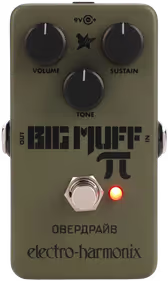
Buy through these links and support Loopy Demos
at no extra cost to you.
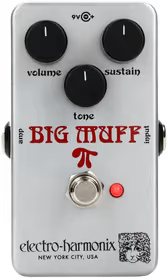
Buy through these links and support Loopy Demos
at no extra cost to you.
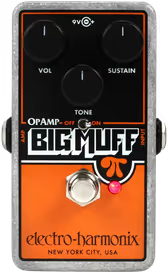
Buy through these links and support Loopy Demos
at no extra cost to you.
Clean Boost & Transparent Overdrive: Cutting Through the Mix
Beyond heavy fuzz textures, clean boost and transparent overdrive are essential for creating dynamic contrast and helping your guitar cut through dense mixes during climactic sections.
The Transparent Champion: MXR Timmy Overdrive
The Timmy is the gold standard for transparent, low-to-medium gain overdrive. Unlike traditional overdrives that can muddy your tone, the Timmy maintains clarity while adding warmth, sustain, and harmonic richness. The powerful bass and treble EQ controls let you shape your tone precisely.
At low gain settings, it provides clean boost with character, perfect for pushing your reverbs and delays during dynamic swells. At higher settings, it adds musical overdrive that enhances rather than masks your guitar’s natural tone – exactly what post-rock demands.
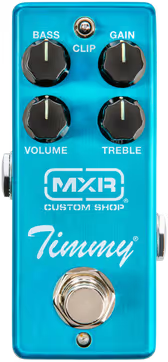
Buy through these links and support Loopy Demos
at no extra cost to you.
Controlling Dynamics: Compression for Post-Rock
Post-rock’s extreme dynamics – from whisper-quiet fingerpicking to wall-of-sound climaxes – benefit from controlled compression that evens out playing inconsistencies while preserving musical dynamics.
The Studio Standard: Keeley Electronics Compressor Mini
The Keeley Compressor Mini provides smooth, musical compression that controls dynamics without squashing the life out of your tone. The single knob design makes it incredibly easy to dial in the perfect amount of compression for post-rock applications.
It’s particularly brilliant for fingerpicking passages and chord work where you want consistent sustain and note definition. The excellent high-frequency retention preserves your guitar’s natural sparkle while adding sustain and evenness that makes your playing sit perfectly in the mix.
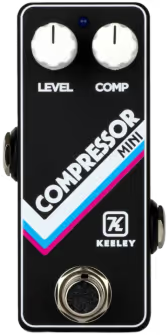
Buy through these links and support Loopy Demos
at no extra cost to you.
Adding Movement: Modulation for Post-Rock
Subtle modulation effects add movement and texture without overwhelming post-rock’s spacious arrangements. The key is restraint – these effects should enhance the atmosphere, not dominate it.
The Analog Beauty: Walrus Audio Julia V2
The Julia V2 is beloved for its analog warmth and versatile D-C-V control that blends between dry signal, chorus, and vibrato. This pedal excels at adding subtle movement that makes static chords more interesting without cluttering the mix.
The lag and depth controls let you dial in everything from gentle seasick wobble to lush, shimmering textures. The stereo outputs create wide, immersive soundscapes that work perfectly with post-rock’s cinematic approach.
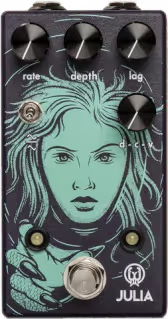
Buy through these links and support Loopy Demos
at no extra cost to you.
The Rhythmic Pulse: Walrus Audio Fundamental Tremolo
Tremolo adds rhythmic pulsing that can drive a song forward or create hypnotic, meditative textures. The Fundamental Tremolo offers three waveforms including a random step mode that creates glitchy, unpredictable patterns perfect for experimental post-rock sections.
The tap tempo lets you sync the tremolo to your song’s rhythm, while the depth control ranges from subtle flutter to dramatic pumping. It’s particularly effective on clean, sustained chords where the tremolo becomes a rhythmic element in itself.
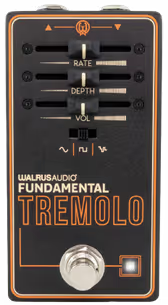
Buy through these links and support Loopy Demos
at no extra cost to you.
The Complex Sculptor: Catalinbread Many Worlds
The Many Worlds is an eight-stage phaser with multiple LFOs and envelope modes that create complex, evolving textures. Unlike simple phasers, it can create sweeping, orchestral movements that add sophistication to chord progressions and single-note lines.
The envelope modes make the phaser respond to your playing dynamics, creating interactive textures that breathe with your performance. It’s perfect for adding subtle movement that keeps long, sustained sections interesting.
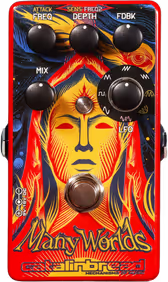
Buy through these links and support Loopy Demos
at no extra cost to you.
Building Your Post-Rock Pedalboard
The Essential Signal Chain
For maximum impact, arrange your pedals in this order:
Guitar → Compressor → Clean Boost/Overdrive → Modulation → Delay → Reverb → Volume Pedal → Amp
The volume pedal at the end ensures your swells affect the entire processed signal, creating those characteristic ambient blooms that define post-rock.
Starter Setup ($600-900)
Essential pedals for getting started with post-rock:
- Walrus Audio Fundamental Delay - Versatile delay with reverse mode
- Walrus Audio Fundamental Reverb - Clean, musical reverb
- Walrus Audio Fundamental Tremolo - Rhythmic pulsing and texture
- Keeley Compressor Mini - Professional compression
- Volume pedal (Ernie Ball VP Jr. or similar)
Total: ~$750 with volume pedal
Professional Setup ($1200-1800)
Building toward professional post-rock tones:
- Walrus Audio Slö - THE essential post-rock reverb
- Boss DM-2W Delay - Vintage analog character
- Walrus Audio Julia V2 - Analog chorus/vibrato movement
- EHX Green Russian Big Muff - Heavy fuzz for climactic sections
- Keeley Compressor Mini - Essential compression
- MXR Timmy Overdrive - Transparent drive and boost
- Volume pedal (Ernie Ball VP Jr. or similar)
Total: ~$1,400 including volume pedal
Dream Setup ($2500+)
The ultimate post-rock pedalboard:
Core Effects:
- Walrus Audio Slö - Essential post-rock reverb
- Walrus Audio Lore - Experimental ambient soundscapes
- Catalinbread Sinkhole - Atmospheric modulated reverb
Time-Based Effects:
- Boss DM-2W Delay - Analog warmth
- MXR Joshua Ambient Echo - Digital precision and stereo width
- Old Blood Noise BL-44 Reverse - Experimental reverse textures
Fuzz Arsenal:
- EHX Green Russian Big Muff - Heavy fuzz for crushing dynamics
- EHX Ram’s Head Big Muff - Balanced fuzz with clarity
- EHX Op-Amp Big Muff - Extreme fuzz for aggressive sections
Modulation & Dynamics:
- Walrus Audio Julia V2 - Analog chorus/vibrato
- Catalinbread Many Worlds - Complex phasing
- Walrus Audio Fundamental Tremolo - Rhythmic textures
- Keeley Compressor Mini - Professional compression
- MXR Timmy Overdrive - Clean boost and drive
Special Tools:
- FreqScene Slow Life - Automatic volume swells
- Volume pedal (Ernie Ball VP Jr. or similar)
Total: ~$2,800+ for the complete arsenal
Getting the Most from Your Post-Rock Rig
Playing Technique Tips
- Master the volume swell - Practice timing your swells to match the song’s rhythm
- Use tremolo picking strategically - Combine with delay for cascading textures
- Embrace space and silence - Post-rock is as much about what you don’t play
- Build gradually - Start minimal and add layers throughout the song
Recording Considerations
- Track with compression to control dynamics while maintaining character
- Use room mics to capture the natural ambience of your amp
- Layer multiple guitar parts with different textures and panning
- Don’t overdo the effects - Subtlety is key to professional post-rock sounds
Amp Settings
Keep your amp completely clean with the volume around 70-80%. Roll your guitar’s tone knob to about 60-75% for warmth without harshness. The goal is a neutral platform that showcases your pedals.
Conclusion
Post-rock guitar is about emotional storytelling through sound design. With the right combination of delays, reverbs, and dynamic control, you can create those expansive, cinematic textures that make post-rock so compelling.
Remember, the most important element isn’t the gear – it’s the musical vision that makes post-rock special. These pedals will give you the tools, but your creativity and emotional connection to the music will make them sing.
Start with the essentials, experiment with combinations, and most importantly, focus on serving the song. The best post-rock moments come from restraint, space, and gradual builds that take listeners on emotional journeys through sound.
Discover More In-depth Demos

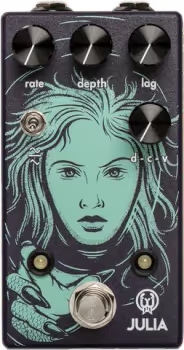
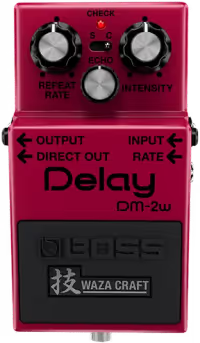

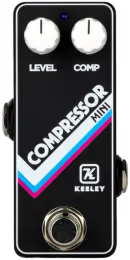

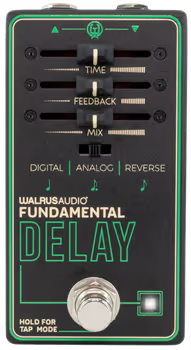

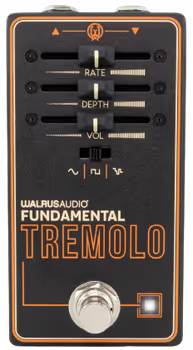
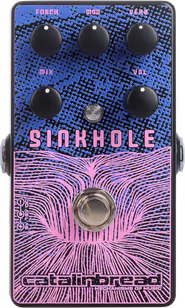
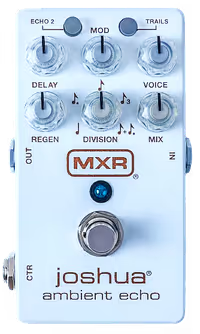

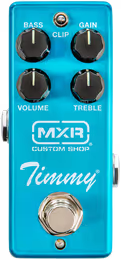
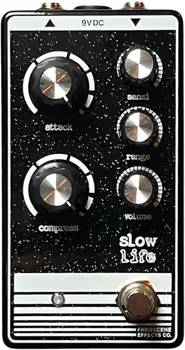
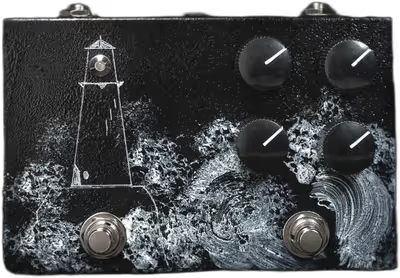
Similar Articles

Best Pedals for Ambient and Experimental Music in 2025
Eight innovative pedals that transform your guitar into an ambient and experimental soundscape machine. From reverse delays and octave shifters ...
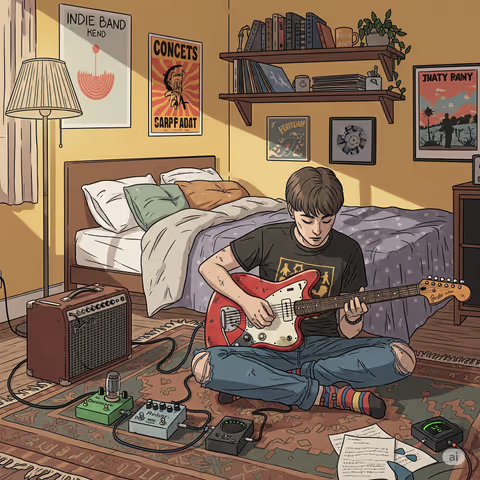
Budget Guitar Pedals That Sound Expensive: Best Value Effects Under $150
Discover budget-friendly guitar pedals that punch above their price point. From the classic BOSS DS-1 to the versatile Walrus Audio ...
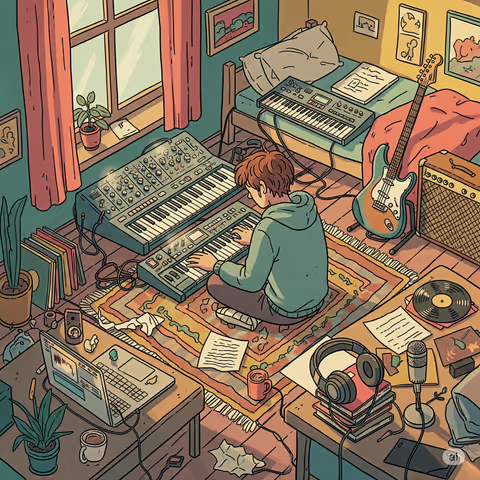
The Complete Guide to Bedroom Pop & Dream Pop Guitar Pedals
Master the dreamy, lo-fi guitar tones of Mac DeMarco, Clairo, and Rex Orange County with this complete guide to bedroom ...